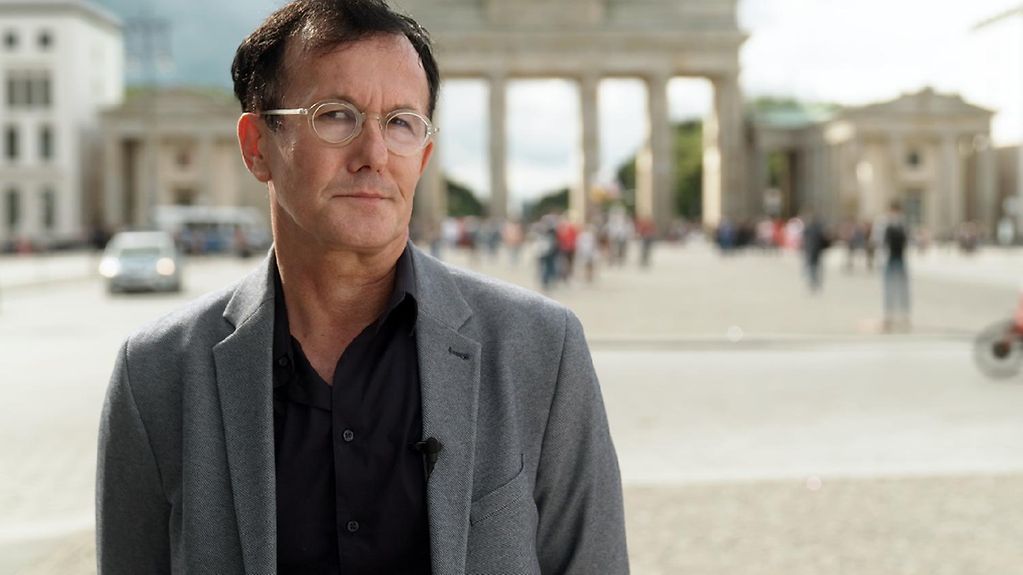Interview - a French view of Germany, 30 years after reunification
The Frenchman Pascal Thibaut experienced German reunification first hand in Berlin. Then, as now, he worked as foreign correspondent, conveying his views of the Federal Republic of Germany to his countrymen and women. In this interview he explains how he sees German reunification, and tells us what he wishes the Germans as they celebrate this important anniversary.
3 min reading time

Pascal Thibaut is Radio France Internationale's man in Berlin, where he has lived since 1990.
Photo: Screenshot/Bundesregierung
Mr Thibaut, what is the first thing that occurs to you when you think of Germany? Do you have a personal anecdote involving our country?
Pascal Thibaut: On 22 December 1989 I was standing right here at the Brandenburg Gate when it was re-opened. It was very crowded and it was a historic event that took me back to my early childhood. There is an old family photo that shows me as a baby in the arms of an elderly German gentleman. A family from our twin town, Gundersheim in Rhineland-Palatinate, was visiting us in Selongey, near Dijon. Behind this man, who served as a soldier during the war, stands my great uncle, who was a German prisoner of war. That is reconciliation in miniature.
What do you think of the reunified Germany, thirty years on?
Thibaut: Seen from the outside, 30 years after reunification Germany appears to be a nation like many others. But thirty years on, there are still many differences between East and West Germany – cultural, social and political differences. Investigating these is extremely interesting for a foreign correspondent.
What impact do you think German reunification has had on Europe?
Thibaut: German reunification accelerated the process of European unification, with, for instance, the Treaty of Maastricht, the introduction of the euro under Mitterrand and Kohl, and the EU enlargement to incorporate Eastern European states.
German reunification, however, has also shifted the balance within the continent. Many countries, including my own country, France, feared that their special position was threatened at the end of the Cold War. Suddenly, France had to work out how to deal with this larger, stronger neighbour. That has left its mark on Franco-German relations.
What does Germany mean for your home country – do you know what France wishes Germany for the future?
Thibaut: For France, my home country, Germany is the most important partner. There are no two countries anywhere else in the world that maintain so many contacts at every level – with political, civil society, cultural and sporting links. Yet there are still many gaps in our knowledge of one another, especially on the French side, This spawns misunderstandings and fans old prejudices. Just as Germany still needs to work on achieving complete reunification at the level of individuals, Germany and France still need to work on their relationship.
What do you see as Germany’s greatest weakness and its greatest strength?
Thibaut: Germany’s greatest weakness must surely be its tendency to see the German model as the best. That is not always helpful for reforms and some people outside Germany see it as arrogant. One of Germany’s strengths is its ability to address problems, and get a large number of actors to come together and hammer out compromises, which are then accepted and move the country forward.
What would you wish the Germans for the next 30 years of reunification?
Thibaut: For the next 30 years of reunification, we can only hope that the people of Germany are reunited at individual level, and that everything that divides East and West takes a back seat. Or at least that the differences become as insignificant as any other regional differences within the Federal Republic of Germany, such as the differences between the North and the South or between Bavaria and North Rhine-Westphalia. Diversity is one of Germany’s strengths, although the country also has weaknesses.
Pascal Thibaut has been Radio France Internationale’s foreign correspondent in Germany since 1997. Before that he worked as a freelance journalist. From 2009 to 2010 and from 2014 to 2020 he was chair of the Verein der Ausländischen Presse in Deutschland (the association of the foreign press in Germany). Thibaut, who has lived and worked in Berlin since 1990, studied at the renowned Institut d'études politiques de Paris (Sciences Po) and then studied journalism at the Centre de formation des journalistes (CFJ), also in Paris.